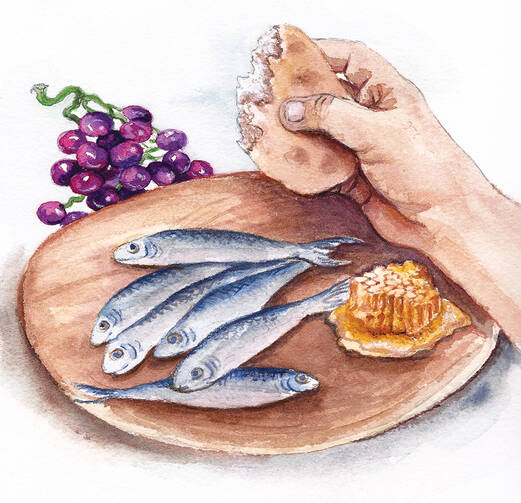The Christos, for a skinny guy, sure was interested in good things to eat: he is constantly talking about bread and wine and oil and grain and seeds and vineyards, and he turns a hundred-some gallons of water into excellent wine, and he turns two fish (probably sardines) and five loaves of barley bread into so much food that 12 baskets of bread shards remain after 5,000 people have eaten, and he grills fish (probably St. Peter’s fish, or tilapia) and bread on the shore of the Sea of Galilee; and even after he died and traveled unto the nether reaches of hell, and was returned by the word of the Father to life, and walked along the road to Emmaus expounding learnedly, and appeared suddenly amid the rattled remaining 11 disciples in a locked room, he is still absorbed with food, for the first question he asks his followers is this: “Have ye here any meat?”
And they gave him a piece of broiled fish and of a honeycomb, and he took it and did eat before them, which you can totally understand, as he must have been waspish with hunger after three days without food. And while troops of scholars have opined that his eating fish and honey is an editorial signifier of his actual corporeal resurrection, and we are to understand his breaking of bread and sharing of water and wine as the first Eucharist, I would like to not so politely insist that there is a blunt salty side to these gustatory reports that we do ill to forget or ignore.
For they are there, scattered amid all the Gospels, not for symbolic reasons, I think, but because they happened, and he actually said those things, and he was a guy, a dude, a bro, a youngish man, in fact, just past 30, with dusty feet and a peevish temper sometimes (remember his tantrum in the temple), and a snippy tone sometimes (he actually says, “Woman, what have I to do with thee?” to his mother at Cana—can you imagine saying that in that tone to your mother?), and hungry most of the time, fond of the breaking of bread.
If he is only a story, a legend, a fable, a faint and faraway hero, a target to whom we direct our muddled prayers, he is nothing. If he is only a hero, a superstar, a superior order of being, he is nothing. The inexplicable genius of Christianity is that it is nonsensical and unreasonable and impossible: a gaunt Arab Jew, speaking Aramaic and Hebrew, copper-skinned, short, slight of build, skilled only in carpentry and scholarly analysis of the Torah, often testy and gnomic when he spoke—this unknown obscure unassuming fellow was the incarnation of that which dreamed and spoke everything that is into being? The star child, the chosen one, the distilled love that set the worlds to whirl in the void, is a stumpy Jewish guy tucking into his broiled fish and honeycomb?
Yes. No wise king nor visionary noble, no epic warrior nor brilliant merchant, no hero at all, no startling muscles, no beautiful visage causing women and men alike to swoon. Just a brown guy beaten by goons, spat upon in the street, hauled in for questioning by the cops, and trundled finally to the killing ground, one among millions forced at knife point to their deaths, shuffling along in chains and despair. A guy. A nobody. One of us. Us.
He was your testy brother, your wayward uncle, your troublesome cousin. He was your difficult son, your awkward neighbor, your unruly classmate, the guy who just didn’t fit in, get with the program, go with the flow. We forget that. We forget he was us. We forget he was a jerk sometimes, snappish and surly, just like us. We forget he wept with fear at night, just like us. We forget he cried aloud in a terrible agony of loneliness, as every one of us has cried, in the bedroom, behind the barn, behind the chapel, in the back room of the bar.
And it came to pass, as he sat at meal with them, he took bread, and blessed it, and broke it, and gave to them. And their eyes were opened, and they knew him. They knew him by the breaking of the bread! And suddenly they recognized his hands, his face, his wry kind hawkish eyes; and they gave him a piece of broiled fish, and of a honeycomb, and he took it, and did eat before them, and almost certainly they ate with him, that very last time, and the bread tasted both sweet and bitter in their mouths, for they must have been stunned, and weary and affrighted, each in his heart knowing he was soon to leave them forever, until they saw him again by the right hand of the Father, in the unimaginable country made of love and joy; and he led them out as far as to Bethany, and he lifted up his hands and blessed them. And it came to pass, while he blessed them, he was parted from them, and carried up into heaven.
But a few hours later, I would guess just after dusk, they sat again at table, those 11 men and surely several women, all of them both joyful and sore of heart, and they broke bread, and remembered him; and so do we all, every morning, noon and night when we do the same, even unto this day; but remember ye the bruised witty dusty peculiar man he was; for it is by the very impossibility of who he was that we may yet be saved, we who are wholly human, but also shot through with the light of the love.








